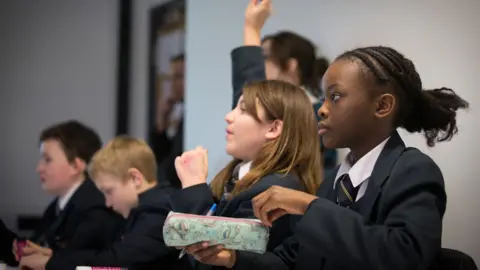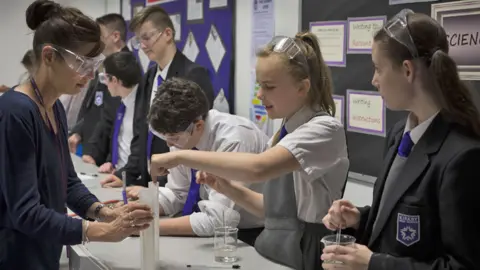Labour would replace 'unfit for purpose' Ofsted

 Getty Images
Getty ImagesLabour says it would scrap England's education watchdog Ofsted, accusing it of being "unfit for purpose".
It would mean the end of grades for schools such as outstanding, good or inadequate.
It will also be seen as a symbolic shift towards the position of teachers' unions who have opposed Ofsted inspections.
Former Ofsted chief, Sir Michael Wilshaw, described the plan as "bonkers".
The promise to abolish Ofsted, announced as Labour holds its annual conference, is a major shift in policy.
Unfair system
Labour says it is taking action to tackle a flawed inspection system which works against schools in deprived areas.
"In too many cases, Ofsted's judgements and grades reflect the affluence of a school's intake and the social class of its pupils - not the performance of the school," said shadow education secretary Angela Rayner.
"School performance is far too important and complex to be boiled down to an over-simplified single grade, reducing all schools to one of four categories," she said.
But opponents will say that is reducing scrutiny and abandoning safeguards over standards.
There will also be claims that under leader Jeremy Corbyn, Labour's education policy is turning into something of a tribute act to the teachers' unions of a couple of decades ago.
While in government in the late 1990s and early 2000s, Labour had repeatedly rejected calls from the National Union of Teachers (now part of a wider National Education Union) to end Ofsted inspections.
The teachers' unions had attacked Ofsted inspections as being unfair, bureaucratic and excessively stressful.
But Labour, under Tony Blair and Gordon Brown, had kept the education watchdog as a key part of maintaining standards and providing information for parents.
Inspection 'health checks'
The plans presented by Ms Rayner would see Ofsted abolished and replaced with a new inspectorate.
There would be a two-stage inspection system - with regular "health checks" run by local authorities and then, if there were concerns, more in-depth visits from full-time, trained inspectors - the HMIs (Her Majesty's Inspectors).
 Getty Images
Getty ImagesIt would mean that parents looking at schools would no longer have the descriptions of inspection ratings, ranging from "outstanding" to "inadequate".
Labour says that such single-word labels do not do justice to the complexities of a school's strengths and weaknesses and instead parents will have more detailed information.
But the fireworks are in the political shift.
Calling for the abolition of Ofsted was once an annual ritual of left-wing delegates at teachers' conferences, under both Conservative and Labour governments.
There was no real expectation of its implementation - because neither party wanted to concede ground that would leave them open to accusations of being soft on standards.
Support from heads
Labour also argued that without external scrutiny of standards, the schools serving the poorest were most likely to be allowed to slip behind.
But that alignment seems to have fundamentally changed.
 PA Media
PA MediaLabour has travelled a long way from the days of Mr Blair and "education, education, education" - moving much closer to the teachers' union view of the school system.
The former leader of the National Union of Teachers, Christine Blower, who once attacked the Labour government's education policies, has recently been nominated by Mr Corbyn to become a Labour peer.
The demise of Ofsted is likely to be popular among teachers, who have criticised the extra workload created by inspections and challenged the credibility of the judgements.
Geoff Barton, leader of the ASCL head teachers' union, backed the idea of reducing the pressure of the accountability system.
"It is crushing the life out of too many schools and has to change," said Mr Barton.
But he was not convinced by the idea of local authorities running the monitoring of schools in their area.
The National Association of Head Teachers thought a "light-touch health-check approach" of the kind proposed by Labour is "the right way to go".
The heads' union liked the idea of schools being "back in the driving seat".
'Lack of scrutiny'
But what's harder to know is how this will be received by parents.
Of course, there is no such thing as a typical parent, but parents looking for schools will want straightforward information to help them make comparisons.
They will also want to know that standards are being monitored by an independent body.
Sir Michael Wilshaw, the former head of Ofsted, says surveys have consistently shown that parents value the opinions of inspectors and they want clear information about school performance.
He says Ofsted has helped to raise standards by identifying "strengths and weaknesses in the English education system".
"I'm old enough to remember how dire our schools were in the 70s and 80s when schools lacked any serious scrutiny," said Sir Michael.
Schools minister Nick Gibb said the announcement was "another sign of the extreme left-wing ideological drift that Jeremy Corbyn's Labour party has taken".
"Now they want to stop parents having even the most basic information so that they can make informed choices about their children's schools," he said.
